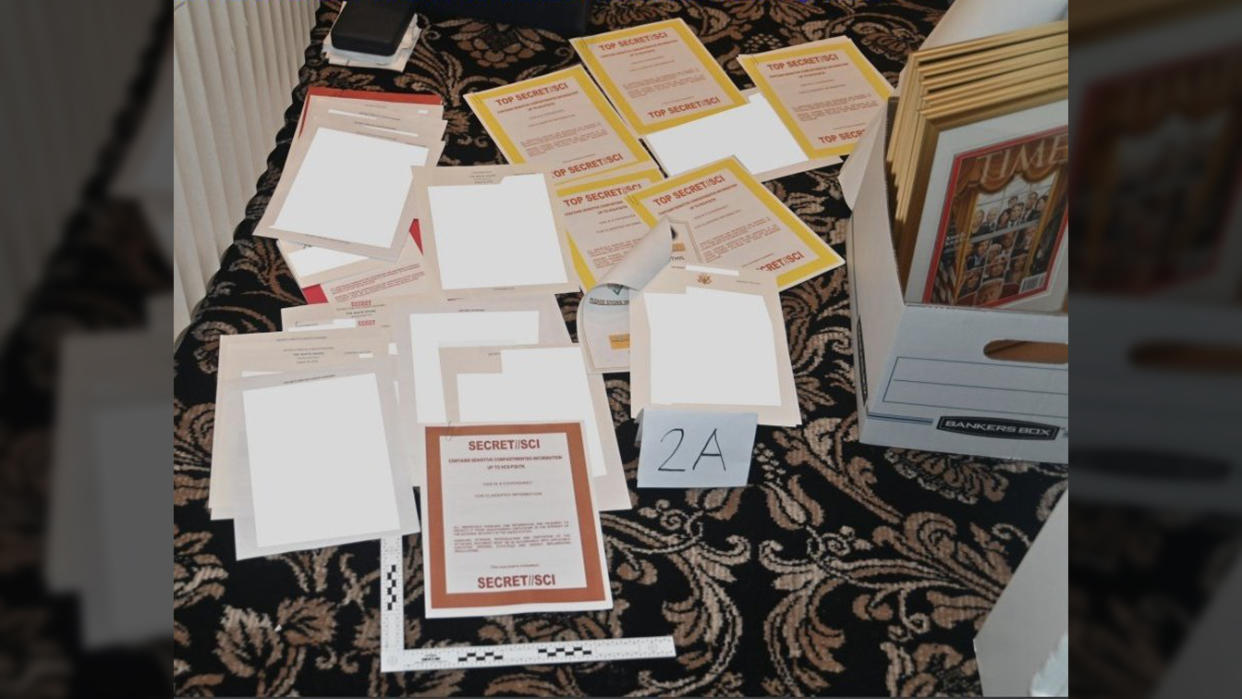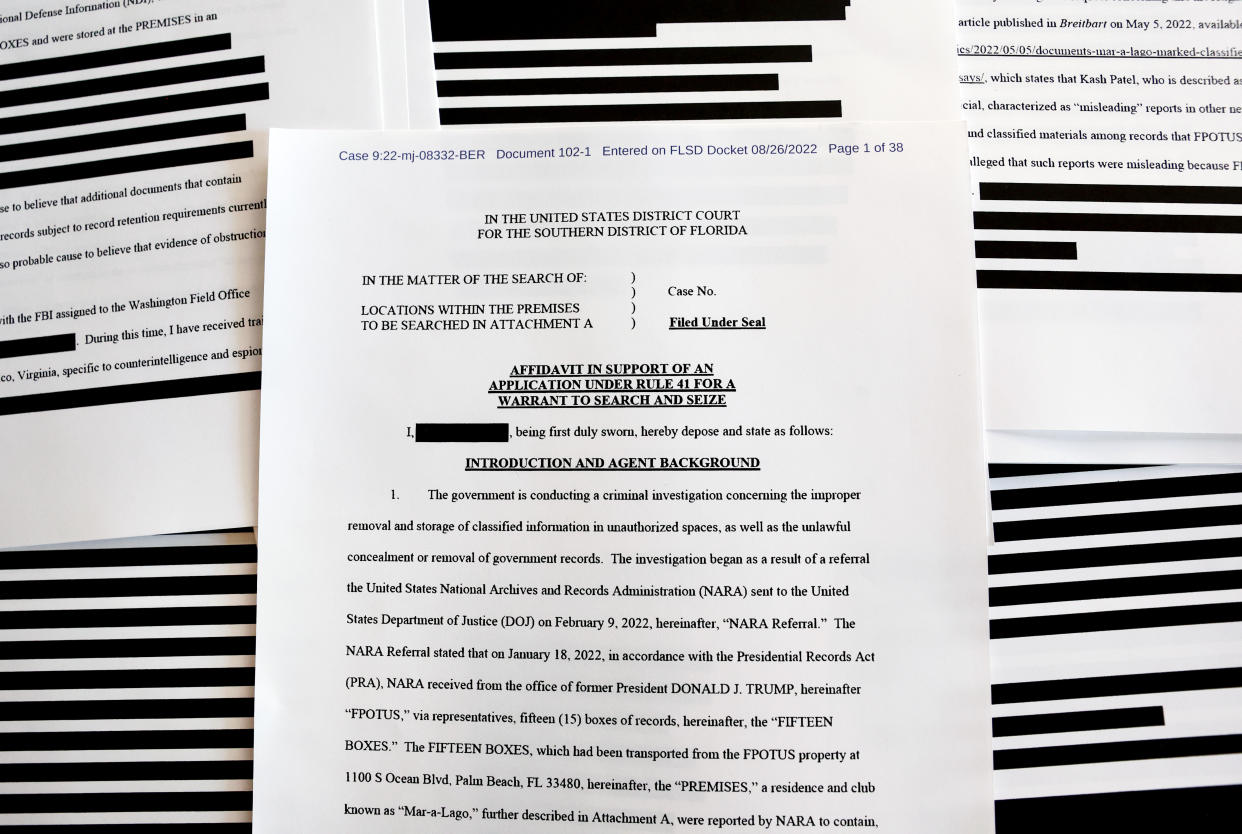Judge grants Trump request for special master to review documents found at Mar-a-Lago
A federal judge in Florida has agreed to grant former President Donald Trump’s request to appoint a special master to review documents that the FBI seized from his Mar-a-Lago estate in Florida.
U.S. District Judge Aileen Cannon, a Trump appointee, ruled in favor of the former president in an order on Monday. She also temporarily blocked the Justice Department from using the records for investigative purposes.
Cannon’s decision marked the first real victory for Trump and his legal team since agents executed a search warrant at his Palm Beach, Fla., estate on Aug. 8

Two weeks after the Mar-a-Lago search, Trump filed a motion in Florida federal court demanding that an independent attorney, or special master, be appointed to oversee the review of evidence in order to determine whether any of the seized materials might be protected under attorney-client privilege or executive privilege, which shields internal executive branch deliberations.
Barbara McQuade, a former federal prosecutor, told Yahoo News that executive privilege should not apply to a former president.
“The privilege belongs to the current executive branch, not a former president,” McQuade said. “Even if Trump enjoys some residual privilege that may be asserted against Congress, he cannot assert it against the executive branch.”
Justice Department attorneys had urged the judge to deny Trump’s request, arguing that he did not have the legal standing to demand independent review of government documents. The government also argued that the request would impede its ongoing criminal investigation and pose a risk to national security interests.
“He is no longer the president, and because he is no longer the president, he did not have the right to take those documents,” Jay Bratt, the counterintelligence chief for the Justice Department’s National Security Division, said at a hearing in Palm Beach on Thursday. “He was unlawfully in possession of them. …This plaintiff does not have an interest in the classified and other presidential records.”

Federal prosecutors had outlined their position on the matter in a lengthy court filing submitted late Tuesday night. In it, they noted that if Cannon did agree to appoint a special master — which she had said she was inclined to do — such a person would need to have the security clearance necessary to view materials marked Top Secret and “sensitive compartmented information,” or SCI.
The Justice Department also used the filing as an opportunity to “correct the incomplete and inaccurate narrative set forth in” Trump’s filings, noting that Cannon, the judge overseeing the special master request, is not the same judge who authorized the FBI’s warrant to search Mar-a-Lago.
In their Aug. 22 motion calling for a special master, Trump’s attorneys claimed, among other things, that materials seized from Mar-a-Lago “are all presumptively privileged,” and that the decision to seek and execute a search warrant on the former president’s home was not only “unprecedented,” but “unnecessary,” because Trump “had been fully cooperative” with all of the FBI’s requests up to that point.
In response, the Justice Department sought to dispel these claims with a detailed account of its efforts to recover presidential records, including dozens of classified documents, that had been moved from the White House to Mar-a-Lago after the end of Trump’s term in January 2021. Tuesday’s 36-page filing described how Trump and his attorneys repeatedly failed to return presidential records, sought first by the National Archives and then by the FBI — even after receiving a grand jury subpoena in May 2022.
In particular, the Justice Department’s filing cited a June 3 meeting at Mar-a-Lago between Justice Department officials and representatives for the former president, who provided the officials with what they certified, in a signed letter, were “any and all documents” that had been found following a “diligent search” in response to the grand jury subpoena.
But federal prosecutors wrote Tuesday that “over one hundred unique documents with classification markings” were recovered during the execution of the search warrant on Aug. 8. “That is, more than twice the amount produced on June 3, 2022, in response to the grand jury subpoena ... were seized.”

Prosecutors wrote that the documents seized during the Aug. 8 search of Mar-a-Lago were likely to have been “concealed and removed” in an effort to “obstruct the government’s investigation” into the potential mishandling of classified materials. Evidence of obstruction has historically been a factor weighed by the federal government when deciding whether to bring charges for mishandling classified information.
Trump reacted to last week’s filing in a series of posts on his social media site, Truth Social, where he repeated the specious claim that he had “declassified” all of the documents taken from the White House to Mar-a-Lago. (While presidents do have the authority to declassify documents, there is a procedure for doing so that Trump does not appear to have followed; more than a dozen Trump administration officials told CNN they had never heard of an order, some calling the claim “nonsense.”)
In a formal response filed to the court Wednesday night, Trump’s legal team accused the government of having "significantly mischaracterized" the June 3 meeting at Mar-a-Lago, and charged that if “Left unchecked, the DOJ will impugn, leak, and publicize selective aspects of their investigation.”
Trump’s attorneys also dismissed the Justice Department’s concerns about the classified material found at Mar-a-Lago, writing in their filing that, “the notion that Presidential records would contain sensitive information should have never been cause for alarm.” Despite Trump’s claim that he declassified all of the documents in question, his attorneys notably agreed with the Justice Department that “it would be appropriate for the special master to possess a Top Secret/SCI security clearance.”
At Thursday’s hearing, Cannon also ordered the release of a more detailed receipt of items that the FBI seized from Mar-a-Lago, which she’d previously ordered the government to file under seal. The detailed property inventory, which was made public on Friday, contains few revelations about the contents or subject matter of the materials themselves, but offers new details about how agents had found documents marked “Classified,” “Secret” and “Top Secret” mixed in with other personal items, such as news clippings, books and clothing.
